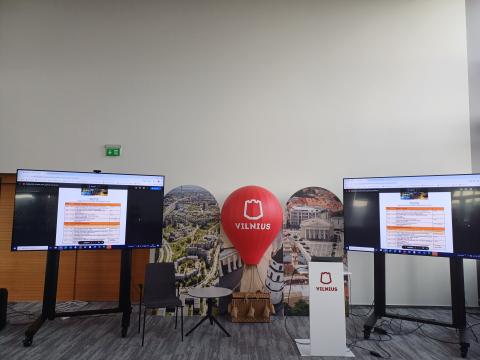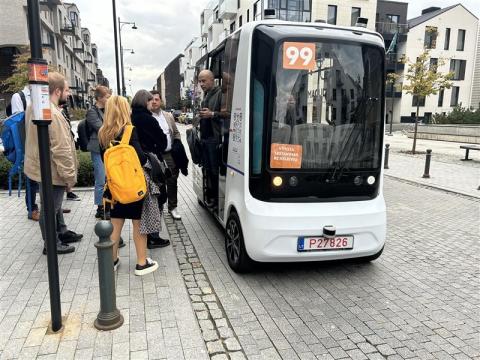4° Exchange of Experience event in Vilnius for EMBRACER!
The fourth EMBRACER Exchange of Experience was organized by "Susisiekimo paslaugos" (JUDU), on 9 and 10 October, in Vilnius. EMBRACER partners and stakeholders from municipalities, ministries, agencies, businesses, and universities participated: more than 30 people met to discuss how “Rethinking modal integration between Public Transport and shared, connected autonomous mobility".

On October 9th, the participants were welcomed by the Head of the Mobility Strategy Department in JUDU, Jonas Damidavičius, and Vilnius City Municipality representative Anton Nikitin, Chief Sustainability Officer of the City of Vilnius.
Before the thematic session began, the EMBRACER lead partner, Jorge Bandeira shared ideas generated within the project to solve mobility issues, emphasizing on some take aways: there is no one-size-fits-all solution to all problems; stakeholders must be involved; let's share not only good examples but challenges and lessons learned too.
Amela Lukač Zoranić, Regional Development Agency of Sandžak SEDA and Pavlo Syrvatka, Lviv Agglomeration, the two Discovery Partners who recently joined EMBRACER, presented their mobility challenges and ongoing initiatives, focusing on better traffic conditions for better life!
The thematic session on “Building Sustainable Mobility Ecosystems: Urban and Rural Perspectives” put together many relevant experiences!
Rokas Urbonavičius, JUDU, told more about Vilnius public transport today and in the near future, considering that the city is getting bigger and bigger and public transport needs to be improved, focusing on customer expectations for the service.
Darren McAdam-O'Connell, Transport & Mobility Forum, shared with participants his sustainable trip from Ireland to Portugal: what's when you have to go from urban areas to rural ones? From one country to another? Darren explained how little things can make a huge difference!
Alessandro Bordigoni, Metropolitan City of Cagliari, explained how the SUMP of the City is evolving and improving thanks to a divulgation campaign, events, and a constant monitoring activity.
Tiago Cardoso, Municipality of Coimbra, told how his city is working hard to improve the transport network and push towards sustainable solutions.
In the second half of the day, the Capacity Building Workshop “Reimagining Transport: Public Transport, Shared Mobility, and Autonomous Mobility solutions” started.
Heikki Liimaitainen, Tampere University, and Mika Rytkönen, Remoted, shared with the audience the lessons learnt in Finland on autonomous mobility: trust, safety and security are always key elements!
Justus Teichgräber, Aufbauwerk Region Leipzig GmbH, and Jan Matussek, City of Leipzig explained how the region is working for the Autonomous Driving development.
Sarang Ali, TTS Italia/inBlenda, reported the experience of the European project AI4CCAM in exploring user acceptance of automated vehicles.
The day ended with a tour in the Šnipiškės suburbs, finding out more about the challenges Vilnius faces in preserving its important heritage while also ensuring the transformation of districts and streets that are essential for the city’s development.
The 10th of October, the Capacity Building Workshop continued: Intelligent Transport Systems in the Bucharest-Ilfov area were discussed with Oana Predoi focusing on projects aimed at mobility integration, also including Mobility as a Service.
SUMP achievements so far and next steps in Ljutomer, Slovenia, were presented by Tadeja Horvat, explaining how the City is improving the public transport network and options also through on demand transport services, trying to reduce the use of private cars.
A Joint Pilot Action Session followed, discussing challenges, barriers and opportunities for implementing a pilot action.
Heikki Liimaitainen, Tampere University, shared practical guidelines on how implementing a pilot on autonomous driving: some theory is definitely needed before practice such as a good plan defining/analysing both the area and the solution characteristics; and defining operating costs and income as well.
Benas Mazeika and Birute Jatautaite, JUDU, explained more about the Vilnius experience in implementing the self-driving bus, from regulation and procurement to integration with existing public transportation and people acceptance. As for this last point, according to a survey recently launched, people are happy about the service and more than 50% will definitely ride the bus!
In the session, also representatives from the Vilnius community were involved, listening to a different point of view: the citizen's one!
At the Steering Group meeting, the EMBRACER Lead Partner and the Communication Manager focused on the results achieved and next steps.
The event closed with a further study visit: EMBRACER partners were able to experience first-hand the self-driving bus that JUDU is testing within the project in the area of Užupis, discussing technical aspects and enjoying a nice ride!
